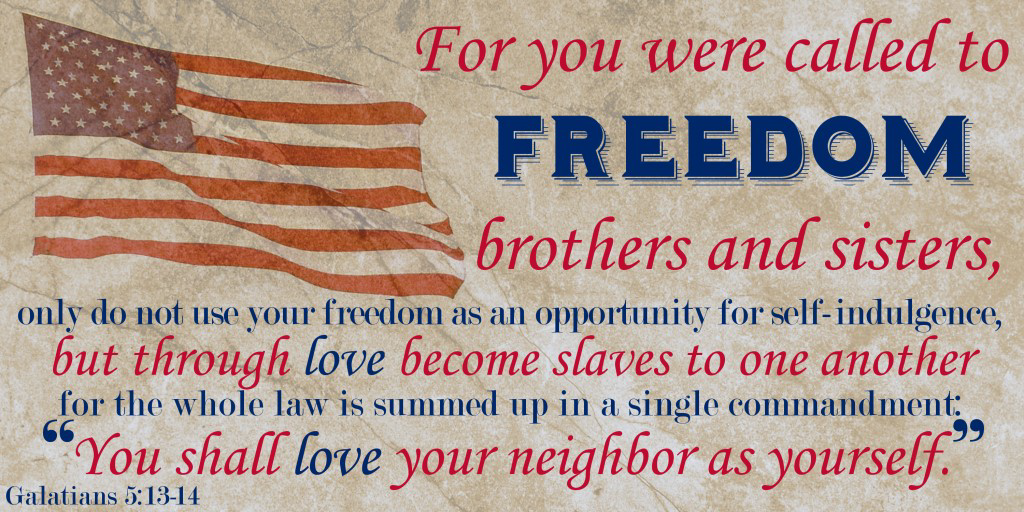Pastor’s Page July 2020
Last month, I compared last year’s journey with Jesus in the Upper Room in the Gospel of John with this year’s walk with Jesus from Palm Sunday to His Ascension in the Gospel of Matthew. Well, I’m going to do that again this month. Last year, in July’s newsletter, I included the fol- lowing graphic with my reflections.
It’s amazing how these themes keep coming back in important ways. God grants us freedom in Christ, but we are never to use our freedom to glorify ourselves. As Paul puts it in Galatians 5, we are not to use our freedom for self-indulgence. Rather, he says, you are to love your neighbor as yourself, which harkens back to our verses at the beginning of this page.
When Jesus was asked to name the greatest commandment, He harkened back to Deuteronomy 6:5—the Shema—when Moses instructed the Israelites to love God with their whole being their heart, soul, and mind. Then, He twins that with a command from Leviticus 19:18. Once again, we are told to love our neighbor as ourselves. It’s in the Old Testament. It’s on Jesus’ lips and falls from Paul’s pen in the New Testament.
As I mentioned in a recent sermon, Jesus’ naming of the Great Commandment and its close second, cuts us to the quick. It humbles us as we are left out of the equation. The Great Commandment has nothing to do with us. Rather, it demands everything of us. It is the high calling of being a sacrifice for God’s glory and the benefit of others. The Great Commandment calls us to follow in our Savior’s footsteps.
Instead of calling us to do something important with our lives or to follow our bliss, it calls us to give our whole self away. It calls us to serve and not be served. Jesus said this in Matthew 20:26-28 when He reminded His disciples that to be great in the Church meant to serve others as He Himself did.
In recent days, we are seeing how intensely people are lining up with their tribes. Rhetoric and protests may only escalate as we draw nearer to the election and may continue long after no matter who comes out the victor. We have been on this trajectory for quite some time. The value that we ascribe to others has been increasingly diminished over the past several decades. As our words have become more coarse, it has become easier and easier to inflict violence on those “on the other side” of issues or on those that are not like us.
Jesus taught us to never devalue “those people”; rather, He called us to love our enemies (Matthew 5:43-48). When Jesus washed the disciples’ feet in the Gospel of John, He even did so for Judas. Are we willing to love as Jesus loved? Are we willing to do what Jesus did?
If we are, we will put His teachings into practice. Last month, I used this space to
remind you of Jesus’ teaching in Luke 14 where Jesus said that we are to invite the ‘broken’—the poor, the crippled, the lame and the blind—to our feasts. In Matthew 25:31-46, Jesus says that what determines our entrée into the eternal kingdom of the Father is whether we cared for the “least of these”—the brothers and sisters of Jesus.
Fulfilling these decrees of Jesus means laying aside personal needs and desires and putting others first. It means God takes center stage of our heart, mind and soul. He should be at the center of all we love, all we think about, and all we desire to be at our core. Then, it means seeking to be a blessing for others.
But that’s not how our world works. People seek for their personal benefits in this world. They defend the needs of their family and friends. If they are truly generous, they will defend people who are like them, who share their val-ues, or who belong to their “tribe.” Who protests for the other person’s rights? Who will speak for those on the margins? Who would dare sacrifice themselves for a cause that is not their own or from which they will not benefit?
We see such secular/worldly thinking entering the church. Jesus foretold that many would have their love grow cold (Matthew 24:12) because the way of faith would be difficult. Our sin nature turns our desires inward and to our- selves. It makes us want to demand our rights. We want to be fed good things and let other people starve. However, the Christian demands that we go hungry so that others may be fed.
As we reopen the church and engage in ministry, what role will you play? Will you invited people to know Christ and to come worship here and to join with us in ministry? Will you seek to build people up in their faith? Will you share your faith with the people you meet in Kenton and Hardin County? Will you join with us in ministry to the “least of these”?
If you see a gap in the life of the church, will you seek to fill it or will you criticize? If we don’t have the program or style of worship that you desire, will you walk away or will you help us to develop something better? Will you join the ministry of the church for what you receive from that labor or will you do those good works to glorify God and to bless your neighbor? Are you living out the Great Commandment (and its close second) because it is your calling, or will you live with a carnal/worldly mindset? Will you seek to build unity that glorifies God, or will you join the chorus of naysayers who want to dismantle the body of Christ here?
Jesus’ teachings are really basic. He began His ministry by saying “Repent [change course], for the kingdom of heaven is at hand” [Matthew 3:2]. At the close of His ministry, He gave us the Great Commandment. In it, He was simply saying, “Love God and love your neighbor and everything else will fall into place!” In Matthew 25:31- 46, He taught that the way into Glory comes by being compassionate and sharing good gifts with those in need—food for the hungry, drink for the hungry, clothes for the naked, and visiting the sick and imprisoned.
That’s a short and doable list. Can we at St. John’s Evangelical Church commit ourselves to accomplishing those items in the previous paragraph? Can we say that we will be defined by those traits? Will we become known as a people sold out for Jesus and His narrow way (Matthew 7:13-14)? Or will the world see us as no different than themselves—dividing along tribal lines and personal desires? Will they see us protesting for our rights and needs to be fulfilled or will they come to know us as Protestants—those who protest the ways of this world and its earthly corruption and who stand for God, His justice, and the blessings of others whether it benefits us or not?
Let us strive to be true Christians who humble them- selves, take up their crosses, and follow Jesus each and every day in each and every way we can (Matthew 16:24-28).
In humble service,
Pastor Randall


